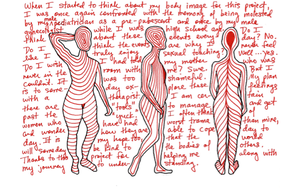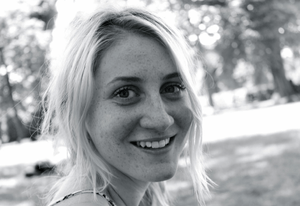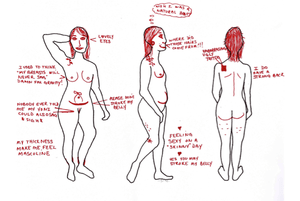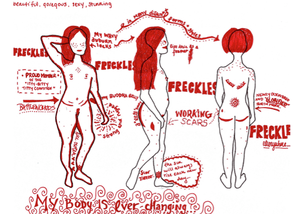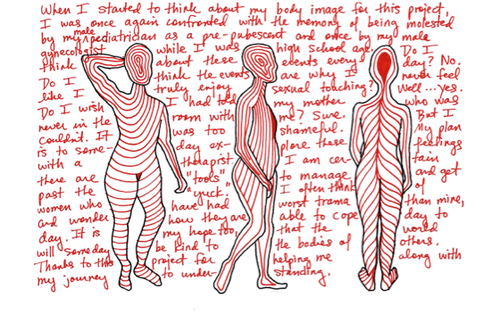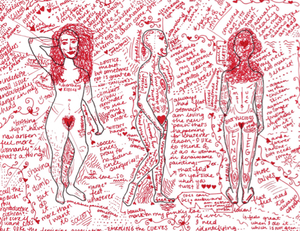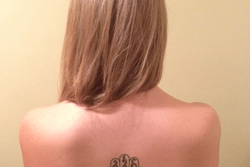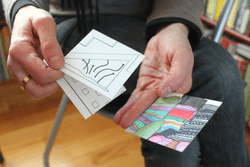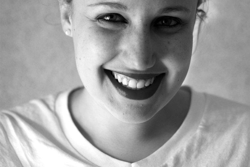Body Talk: Delving into The Body Journey with Creator Miriam Ross
The project arose from an assignment. Miriam was studying abroad in Italy, taking a class called “Art and Society.” The class made her ponder the way her art and the art of her generation would one day be viewed by the world. The class explored different projects being done about the body, and students were asked to “portray the body of our time.” Miriam had already made the female form a focus of her work. In order to make a statement about the “body of our time,” however, she reached out to other women. She asked them to look at the image of Barbie, and think about how their own bodies differed. She made alterations to a Barbie-shaped outline with red pen and wrote the women’s descriptions of themselves underneath the drawings. This was not simply an art project for Miriam, but a response to a pervasive problem in our society, a conversation that she felt had become necessary.
Though Barbie was a key player in the initial project, after hearing people’s stories and perspectives, Miriam realized, “This isn’t about Barbie, this is about us.” She decided that instead of taking the red pen to outlines of bodies herself, women should have the control to portray their bodies as they see them. She sent out templates, red pens, and envelopes to women who wanted to participate.
So far, about 500 women have participated in the project, in many different languages. Some women feel mostly happy with their bodies, expressing some quirks or challenges. Others show parts of themselves they dislike. Many describe more lifelong challenges of trauma; chronic illness or pain, abuse, rape, sexual assault, eating disorders, alcoholism, even attention deficit disorder. While Miriam expected people to document relationships with their bodies, the number of people who wrote about their mental and emotional health surprised her. The project has come to serve as what Miriam calls, “a one-way ticket into the psyche.” One woman’s story suggests that loving how we look doesn’t always correlate with being happy. During a divorce she lost a lot of weight and though she was unhealthy and depressed, she had never felt so sexy in her life. From her and others, we learn how deeply connected mental and emotional health is to the physical self and the life events that take place over time. “The project honors the fact that having a body is a journey,” Miriam explains.
A common theme Miriam has uncovered is apology. To deflect the criticism women so often are subject to, we protect ourselves by minimizing our own experiences. Miriam notes one heartbreaking story, where a woman writes about having been molested by two different doctors in her past. At the end of her narrative, she says that she knows other woman have faced worse trauma. Women often feel like our stories are not worth sharing, that they’re not painful enough to warrant our emotions. The Body Journey shows women that all of their stories and thoughts matter. This tendency to minimize also leads women to add modifiers to compliments we pay ourselves. We may say, “I like my hair, but it’s frizzy,” or “My stomach is nice, but it could be flatter.” Fear of being called vain or exposing ourselves to criticism keeps us from loving ourselves with abandon.
Miriam has also spent time considering how having a female body fits into Judaism. Some traditions can be interpreted as demeaning to women, even if that is not their original intention. One of the Blessings for Everyday (Nissim b’chol Yom), that some Hassidic and Orthodox men say, expresses gratitude that they are not women because women don’t have the obligation to fulfill all of the mitzvot. Having strong Jewish women in her life—her mother and aunt are both rabbis—has helped Miriam put a feminist spin on traditions that may seem sexist or outdated. Her mother participates in a movement that prints t-shirts reading, “Thank God who has made me a woman.” Other Jewish traditions also offer perspectives of self-acceptance: a blessing called Asher Yatzar thanks God for creating us in His image. Miriam learned this prayer at a young age. It taught her that our bodies were originally created equally, and we are meant to respect them.
Miriam too is happy to be a woman. While her project has served as therapy for many, it is also a celebration. Recently, Miriam brought this celebration off the page and into an in-person event in Barcelona, where she is currently living. She collaborated with a sexologist/psychologist from Galicia to bring together an international group of women-Catalan, Spanish, Italian, and German. They talked about The Body Journey for a bit, and then they drew or wrote about their bodies.
Whether in a room together in Spain, or mailing in their drawings from home, women all over the globe are rejoicing about this project. It gives them a chance to adore the bodies they have and the experiences that make them human.
To see more of The Body Journey, check out the facebook page, or website. To join the journey, email hellobodyjourney@gmail.com.


